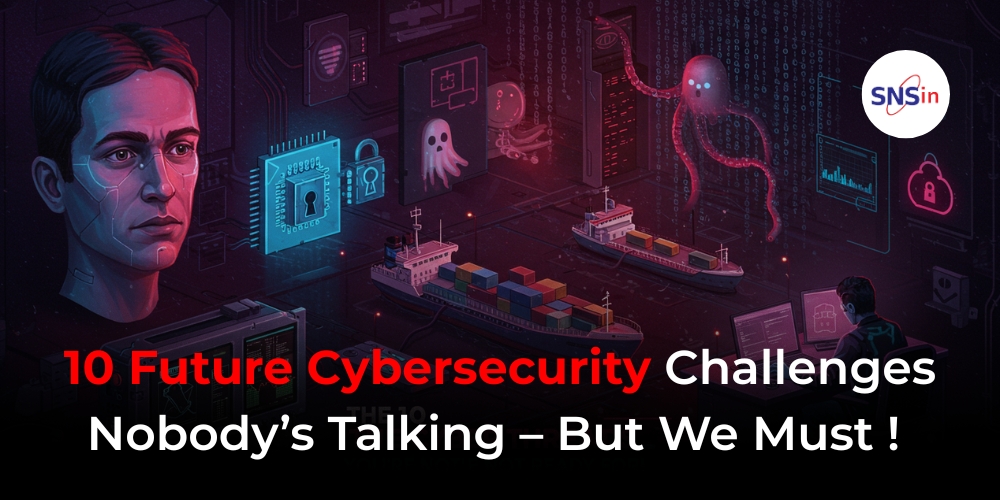When it comes to cybersecurity, most conversations sound like broken records: Ransomware this, Phishing that … !
Sure, these threats aren’t going away anytime soon, but what if we told you there’s a whole new set of risks quietly brewing beneath the surface – risks that could catch businesses completely off guard?
The digital battleground is evolving, and some of tomorrow’s biggest cybersecurity challenges are still flying under the radar.
Let’s pull back the curtain on 10 future cybersecurity threats that barely only few are whispering about. But needs more attention.
1. Deepfakes Will Outsmart Your Eyes and Ears:
Forget phishing emails – the next wave of scams will call you, FaceTime you, and video message you… looking and sounding exactly like your boss.
Deepfake technology is growing more sophisticated by the day. Soon, spotting a fake from the real thing might be nearly impossible – unless you have robust verification processes in place.
Pro tip: In the future, trust (but verify everything).
2. Quantum Computers Could Crack Today’s Encryption:
Quantum computing promises to solve massive problems at mind-bending speeds.
The bad news? It could also obliterate the encryption methods we currently rely on to protect sensitive data.
If your company is storing customer information under today’s standards, you might as well be writing it on the back of a napkin once quantum hits its stride.
Time to start thinking about quantum-resistant encryption before it’s too late.
3. Smart Cities Could Become Smart Targets:
As cities around the world install “smart” infrastructure – traffic lights, water systems, energy grids – the attack surface grows exponentially.
One well-placed cyberattack could freeze traffic, shut down power stations, or even halt emergency services.
Tomorrows cyberattacks could very well have real-world, physical consequences.
4. Medical Devices Will Become New Targets:
We’re connecting everything these days – including devices inside our bodies. Pacemakers, insulin pumps, and other connected medical tools could be prime targets for cybercriminals.
In the wrong hands, hacking a device could become a life-threatening crime.
Cybersecurity in healthcare isn’t just about protecting patient data anymore – it’s about protecting lives.
5. Fake Cyberattacks to Claim Insurance Money:
Here’s a twist nobody’s prepared for: insiders staging fake ransomware attacks just to claim cyber insurance payouts.
As businesses invest heavily in cyber insurance, the temptation for fraud will rise too.
In the future, insurance companies will need lie detectors… or maybe just really good threat forensics teams.
6. Supply Chain Attacks Will Get Sneakier:
You might lock your front door, but what about access via your neighbor’s loosely connected door?
Cybercriminals are increasingly sneaking in through third-party vendors and suppliers. And with businesses more interconnected than ever, it’s the weakest link that often opens the biggest door.
Vendor audits and security partnerships are about to become non-negotiable.
7. Ghost Data Will Haunt Companies:
Think deleting files erases them forever? Think again.
With countless backups, cloud servers, and hidden caches, your “deleted” data can stick around longer than a bad internet meme. Cybercriminals could retrieve this ghost data and use it against businesses.
Data management will soon mean actually ensuring your data is dead and buried.
8. IoT Will Turn Offices into Hackers’ Playgrounds:
Smart lightbulbs. Smart locks. Smart coffee makers.
Every new connected device is another door into your business’s network. Imagine getting hacked through the office fridge – it’s not a joke anymore; it’s a very real risk.
Companies will have to get serious about device authentication and network segmentation before IoT turns into a full-on invasion.
9. The Privacy vs. Productivity Tug-of-War:
With remote work here to stay, employee monitoring tools are booming.
But overly aggressive surveillance can backfire – damaging trust, morale, and even sparking legal battles over privacy violations.
Tomorrow’s challenge? Finding a balance between security and humanity. Because happy employees are often your first and strongest – line of defense.
10. Cybersecurity Teams Are Burning Out:
Let’s face it – cybersecurity professionals are human, too.
The relentless pressure, late-night incident responses, and the “always-on” culture is pushing many to the brink. Cyber fatigue leads to mistakes, missed threats, and mass resignations – a silent crisis companies can’t afford to ignore.
If you’re serious about building cyber resilience, you need to invest in the mental health of the warriors guarding your gates.
How Smart Companies Are Getting Ready?
The future belongs to businesses that can think two moves ahead. Here’s what proactive companies are already doing:
- Exploring post-quantum encryption before it becomes urgent.
- Training employees to spot deepfakes and social engineering tactics.
- Auditing third-party vendors as carefully as their own networks.
- Designing IoT security policies instead of adding devices blindly.
- Prioritizing cybersecurity teams’ well-being as part of overall risk management.
In short: they’re planning for tomorrow’s threats today – not reacting once it’s too late.
Final Thoughts:
The future of cybersecurity won’t just be about bigger firewalls or smarter antivirus software.
It will be about anticipating threats that don’t even have names yet. It will be about building a culture of awareness, resilience, and constant innovation.
Companies that wait for problems to hit the headlines are already too late.
Those who prepare now? They’ll be the ones still standing – and thriving – no matter how the digital battlefield shifts.
Want to get a head start protecting your business from the threats of tomorrow?
Connect with SNS India today – and let’s build a future-proof cybersecurity strategy together. Write to us for a trusted advise at [email protected]
Author
NK Mehta
![]()




